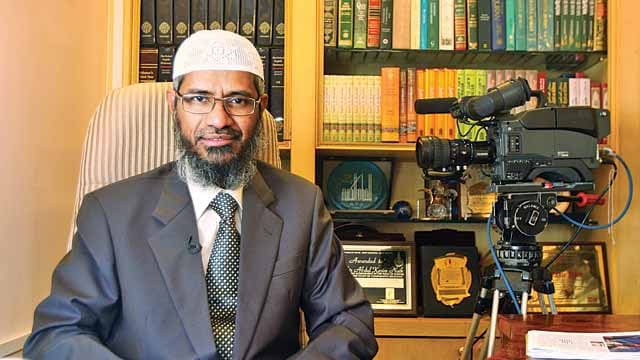The Centre seems set to slap terror charges on Islamic tele-evangelistZakir Naik+ for motivating over 50 people accused in terrorism-related cases, while declaring his Islamic Research Foundation+ (IRF) as an “unlawful” organisation.
Top government sources said the two-pronged action plan against Naik, a popular Islamic missionary who has been accused of being the “inspiration” behind the Dhaka restaurant attack in July, has been worked out on the basis of scrutiny of his speeches.
They said the home ministry, armed with legal opinion, has decided to book Naik under the Unlawful Activities Prevention Act (UAPA) for speeches it has, along with the Maharashtra government, found to be laced with jihad-inspiring content. “The primary ground for invoking terror charges against Naik are statements by those involved in past terror acts, conceding that they were motivated by his speeches,” said an intelligence officer. Naik, who was abroad when the probe into the Dhaka attack turned him up as the man who inspired the jihadis, put off his plan to return to India. He is unlikely to return anytime soon.
Among the alleged terrorists who have recorded statements against Naik are Feroze Deshmukh, a former IRF employee arrested for his alleged role in the 2006 Aurangabad arms haul case; Qateel Ahmed Siddiqui, an Indian Mujahideen member murdered inside Pune’s Yerwada prison in June 2012; alleged IS recruiter Afsha Jabeen, who was arrested in September 2015 on deportation from the UAE; and Mudabbir Sheikh, Mohammed Obaidullah Khan, Abu Anas and Mohammed Nafees Khan, who were arrested in raids by the NIA in January for floating an IS affiliated outfit named Junood-ul-Khalifa-e-Hind.
Authorities have also decided to apply the UAPA to ban IRF on grounds of spreading hatred between religious communities through public speeches, activities and “forced conversions” by its members. It may be recalled that brother of one of the 17 Kerala youth who recently joined IS and are believed to have fled to IS-controlled Khorasan province in Afghanistan, has alleged that he was forced by an IRF member to come to Mumbai for conversion.
An ‘unlawful’ association is different from a ‘terrorist’ organisation listed under UAPA. The law, while defining an “unlawful association”, covers any organisation “which has for its object any activity that is punishable under Section 153A or 153B of IPC” – provisions dealing with threat to social and communal harmony.
Once IRF and its associate organisations are declared as ‘unlawful’, it will face closure of its offices and interests across the country. Apart from having its head office at Mumbai, IRF runs the Islamic International School in Mumbai and Chennai through the IRF Eductional Trust and owns many properties in Mumbai. Sources indicated that the ban on IRF may lead Maharashtra government to step in and take over reins of Islamic International School in Mumbai or entrust its management to another organisation, so as not to adversely affect the education of pupils studying there. A similar action may be undertaken for the Chennai branch of the school.
Sources said that the Intelligence Bureau compiled a list of Naik’s provocative speeches and submitted it to the home ministry, which in turn forwarded this to NIA for action. NIA investigators are now going through these speeches to confirm their pro-terror content and identify the UAPA provisions to be invoked against the Salafist preacher for motivating people to commit acts of terrorism.
Courtesy:TOI
http://timesofindia.indiatimes.com/india/Govt-set-to-slap-terror-case-on-Zakir-Naik-ban-his-NGO/articleshow/53880542.cms

